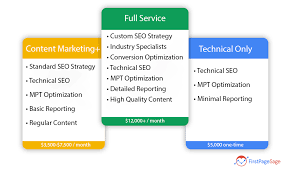The Basics of Search Engine Optimization (SEO)
Search Engine Optimization, commonly known as SEO, is a fundamental aspect of digital marketing that aims to improve a website’s visibility on search engine results pages. By optimising various elements of a website, businesses can increase their chances of ranking higher in search engine results and attracting more organic traffic. Here are some key components of basic SEO:
Keywords
Keywords are the foundation of SEO. These are the terms and phrases that users type into search engines when looking for information. Conducting keyword research to identify relevant keywords for your business is crucial. Incorporating these keywords strategically into your website’s content, meta tags, and headings can help search engines understand the relevance of your site to specific queries.
On-Page Optimisation
On-page optimisation involves fine-tuning individual web pages to improve their search engine rankings. This includes optimising meta titles, meta descriptions, headings, and image alt text with relevant keywords. Creating high-quality, engaging content that provides value to users is also essential for on-page SEO.
Off-Page Optimisation
Off-page optimisation refers to activities conducted outside of your website that can impact its search engine rankings. Building high-quality backlinks from reputable websites to your site is a key off-page SEO strategy. Social media engagement, influencer partnerships, and guest blogging are other effective ways to boost your site’s authority and credibility.
Technical SEO
Technical SEO focuses on improving the technical aspects of your website to enhance its performance in search engine results. This includes ensuring fast page loading speeds, mobile responsiveness, secure HTTPS connections, and proper URL structures. By addressing technical issues such as broken links and duplicate content, you can provide a better user experience and improve your site’s SEO performance.
Monitoring and Analysis
Regularly monitoring and analysing key performance indicators (KPIs) is essential for evaluating the effectiveness of your SEO efforts. Tools like Google Analytics and Google Search Console provide valuable insights into traffic sources, keyword performance, click-through rates, and more. By tracking these metrics over time, you can identify areas for improvement and refine your SEO strategy accordingly.
In conclusion, mastering the basics of search engine optimization is crucial for enhancing your online presence and driving organic traffic to your website. By implementing sound SEO practices such as keyword research, on-page optimisation, off-page strategies, technical improvements, and continuous monitoring, you can position your site for success in the competitive digital landscape.
Understanding Basic SEO: Key Questions and Answers for Optimising Your Website
- What is search engine optimization (SEO) and why is it important?
- How do keywords impact SEO and why are they crucial for website visibility?
- What are the key components of on-page optimisation in SEO?
- How does off-page optimisation contribute to improving search engine rankings?
- What is technical SEO and how does it affect a website’s performance in search results?
- Why is monitoring and analysis essential for evaluating the effectiveness of SEO strategies?
What is search engine optimization (SEO) and why is it important?
Search engine optimization (SEO) is the process of enhancing a website’s visibility on search engine results pages through various strategies and techniques. It involves optimising content, meta tags, and technical aspects of a website to improve its rankings and attract organic traffic. SEO is essential for businesses and individuals looking to increase their online presence, reach a wider audience, and drive relevant traffic to their websites. By implementing effective SEO practices, such as keyword research, on-page optimisation, and link building, organisations can improve their chances of being discovered by potential customers and standing out in the competitive digital landscape. In essence, SEO plays a critical role in helping websites rank higher in search results, ultimately leading to increased visibility, credibility, and opportunities for growth.
How do keywords impact SEO and why are they crucial for website visibility?
Keywords play a crucial role in Search Engine Optimization (SEO) as they directly influence a website’s visibility on search engine results pages. When strategically incorporated into website content, meta tags, headings, and other elements, keywords help search engines understand the relevance of a site to specific search queries. By targeting relevant keywords that align with user intent, businesses can attract organic traffic and improve their chances of ranking higher in search results. In essence, keywords act as the bridge between what users are searching for and what a website offers, making them essential for enhancing website visibility and driving targeted traffic to the site.
What are the key components of on-page optimisation in SEO?
On-page optimisation in SEO encompasses several key components that are essential for improving a website’s search engine rankings. These components include optimising meta titles and descriptions with relevant keywords, structuring headings to enhance readability and keyword relevance, creating high-quality and engaging content that satisfies user intent, incorporating internal links to improve site navigation and user experience, and ensuring image alt text is descriptive and keyword-rich. By focusing on these elements of on-page optimisation, businesses can increase their visibility in search engine results pages and attract more organic traffic to their websites.
How does off-page optimisation contribute to improving search engine rankings?
Off-page optimisation plays a crucial role in improving search engine rankings by enhancing a website’s authority, credibility, and relevance in the eyes of search engines. One of the key ways off-page optimisation contributes to higher rankings is through the acquisition of high-quality backlinks from reputable websites. These backlinks act as ‘upvotes’ for your site, signalling to search engines that your content is valuable and worthy of being displayed to users. Additionally, engaging in social media activities, influencer partnerships, and guest blogging can further boost your site’s visibility and reputation online, ultimately leading to improved search engine rankings and increased organic traffic.
What is technical SEO and how does it affect a website’s performance in search results?
Technical SEO refers to the optimisation of a website’s technical elements to enhance its visibility and performance in search engine results. It focuses on improving factors such as site speed, mobile responsiveness, secure connections, URL structures, and indexing. By addressing technical issues and ensuring that a website is well-structured and user-friendly, technical SEO plays a crucial role in determining how search engines crawl, index, and rank the site. A website with strong technical SEO is more likely to provide a seamless user experience, leading to higher search engine rankings and increased organic traffic. In essence, technical SEO forms the foundation upon which other SEO strategies build, ultimately influencing a website’s overall success in search results.
Why is monitoring and analysis essential for evaluating the effectiveness of SEO strategies?
Monitoring and analysis are essential components for evaluating the effectiveness of SEO strategies because they provide valuable insights into the performance of a website in search engine results. By tracking key metrics such as organic traffic, keyword rankings, click-through rates, and conversion rates, businesses can measure the impact of their SEO efforts and identify areas for improvement. Monitoring allows businesses to stay informed about changes in search engine algorithms and user behaviour, enabling them to adapt their strategies accordingly. Analysis helps in understanding which tactics are working well and which ones need adjustment, leading to more informed decision-making and continuous refinement of SEO strategies for optimal results.




